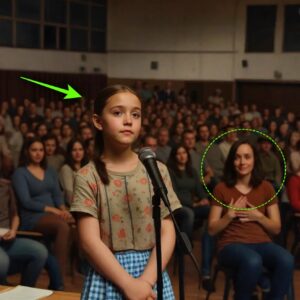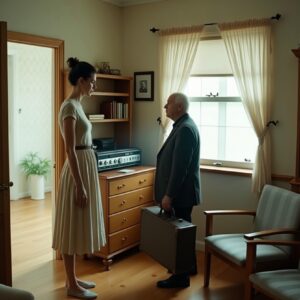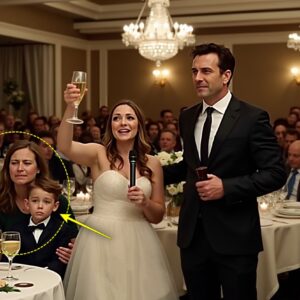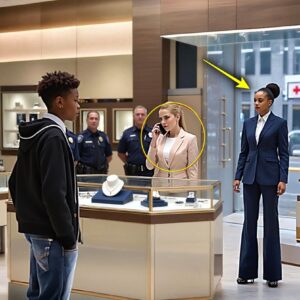After her father’s death, Jenelle returns home to grieve, only to be handed a rent bill by her much younger stepmother, who was once her cruel middle school teacher. But Elizabeth doesn’t know the house was left to Jenelle. Now, grief turns to grit, and Jenelle’s silence becomes her sharpest weapon.
The house still smelled like him.
Cedar and coffee, and the faintest trace of the cologne he always oversprayed before a dinner out. I kept inhaling, afraid that the scent would vanish, that every trace of him would slip through my fingers just like he had.
One minute he was here, joking about how he’d live to be ninety. The next, a call from the highway patrol.
Single-car collision. Fatal.
I flew in the next day and hadn’t left since.
My apartment in the city sat untouched, gathering dust. I needed to be here. In this house. My childhood home. The only place where grief didn’t feel like freefall.
Elizabeth, my young and wannabe-hip stepmother, was… polite. Her two young kids ran up and down the hallways, voices high and wild. They didn’t understand what had happened, not really.
And Elizabeth? She acted like the queen of the manor, cool, composed, with just the right shade of sorrow for public viewings.
I was 22. She was 39.
And once upon a time, she had been my seventh-grade English teacher.
Back then, she went by Ms. Elizabeth. She had a sleek ponytail, red pens that bled sarcasm, and a voice that curled into a purr when she was mocking someone. Especially me.
I was bright but eager. I asked questions, lots of them. I thought that was what school was for.
But every time I raised my hand, she’d sigh dramatically.
“Let’s give someone else a chance to speak, Jenelle,” or “We’ve heard enough from the front row.”
Once, she handed back a book report with a note that read:
“Not everything needs your opinion, sweetheart.”
The other kids laughed. I stopped raising my hand. My mother had long since passed. And I never told my dad.
When he introduced me to his new girlfriend years later, glowing, proud, smitten, I felt the floor tilt. I remember blinking at her, trying to reconcile the woman at the dinner table with the one who used to make me feel too much in front of 30 kids.
She smiled at me like we were strangers.
I said nothing.
Dad was already in his late 50s. After my mom passed, he spent years alone. Elizabeth made him laugh again. And he looked lighter with her around.
So I buried it. Swallowed it. All of it. For his sake.
After the funeral, I gave her space.
I folded the laundry. I cleaned the kitchen. I stocked the pantry without being asked. I helped with her kids when they were too restless to sit still and too young to understand what loss looked like.
I cooked. I cleaned. I grocery-shopped.
I didn’t complain, even when she barely acknowledged it. I kept my mouth shut when she skipped out on every thank-you and disappeared into her bedroom for hours while I sifted through Dad’s belongings with shaking hands.
I was grieving.
But she was hosting.
I took care of Dad’s clothes, his notebooks, his old vinyl records. Each item felt like a landmine. I’d open a drawer and find a birthday card I made for him at eight. A grocery list in his messy handwriting. A scarf that still smelled faintly like him.
I slept in the guest room, my old room, where my childhood posters still curled at the edges, corners browned and curling. It felt like being 12 again. Like being small in a house that used to feel safe.
We barely spoke.
That lasted until exactly one month after the funeral, when she knocked on my door with a crisp envelope in hand.
“I thought we should clarify a few things,” she said, her voice syrupy sweet. Too sweet. Too smooth. Sickly.
I opened the envelope. Inside was a bill. Neatly itemized.
Rent for the room. Utilities. Groceries. Two dinners she’d made for all of us. Cleaning supplies (“used while I was present,” she’d noted too).
I stared at it. The page didn’t blur, though I half-expected it to. I felt the blood drain from my face but I didn’t show it. Not in front of her.
This woman, who had married my father. Who had once ridiculed me in front of a classroom. Who now walked these halls like she built them. Who was now charging me to exist in the room I’d grown up in?
Of course, she was.
Little did Elizabeth know, I wasn’t going to allow it.
The next morning, I made coffee. Toasted a bagel. Took my time to get into the day.
I moved through the house like it wasn’t breaking my heart. Like every creak of the floorboards didn’t sound like Dad calling my name. Like I didn’t ache from the absurdity of having to prove my place in a home I was born into.
Then I slid an envelope onto the kitchen counter just as she breezed in, wearing a robe too silky for mourning.
“Thank you,” she said, reaching for it. She smiled, smug and expectant, like payday had come early.
She opened it. And froze.
Her mouth twisted as she pulled out, not a check, but a single folded sheet.
“What the hell is this?!” she snapped, color rising in her face.
“I figured we should clarify a few things,” I looked at her evenly, the corners of my mouth barely twitching.
She didn’t notice the front door open behind her. But I did.
Five minutes later, my attorney, Kyle, stepped into the kitchen with a folder tucked under his arm and a calm expression that said this was just another Tuesday.
“I think you might want to sit down, Elizabeth,” I told her, still calm. I was collected. I was steady in a way that I hadn’t felt since Dad died.
“Why is there a… lawyer here?” Elizabeth paled.
Kyle cleared his throat and opened his briefcase.
“As of Jacob’s passing, this property is now legally owned by Jenelle. Your late husband left the house to her in his will. Sole beneficiary. Signed. Notarized. Filed with the county two years ago.”
Her mouth opened and closed like a fish pulled from water.
“No. No way. That’s fake! That’s… Jacob would never… he loved me!”
“He did love you, Elizabeth,” I said gently. “And my dad left a small trust for your kids. But the house? That was always going to be mine. Not for the value but for the memories. For the nostalgia cemented into the walls. He built it with my mother. He wanted it to stay in the family.”
“That’s not fair,” she said, shaking her head as if to shake away my words.
“What’s not fair,” Kyle said coolly. “Is attempting to charge someone rent in their own home. You tried to exploit Jenelle’s grief.”
I met her eyes.
“I didn’t say anything sooner because I was grieving. I was mourning. Because I thought we could coexist. For his memory.”
I took a breath.
“But if you’re going to treat me like a tenant, then I’ll remind you who holds the keys.”
She sputtered. Threatened to contest the will. She claimed that my father had promised her more. More in life and from death.
But promises spoken and documents signed are two very different things.
Legally, she had no standing. And emotionally? Elizabeth had burned every last bridge.
I gave her thirty days. I didn’t have to. But I did.
The day she left, she didn’t say goodbye. The moving truck pulled away just before sunset. Her kids looked confused. I didn’t blame them. They didn’t ask for this.
I stood on the porch, arms crossed, heart strangely steady. The wind shifted and carried the scent of the lilacs my mom had planted under the kitchen window.
It hit me like a whisper:
“You did what needed to be done here, Elle.”
She never looked back. And I didn’t wave.
The silence afterward was profound.
There were no clattering toys. No clipped footsteps. No passive-aggressive sighs at the breakfast table. No syrupy voice gliding through the kitchen like it belonged there.
Just me. The hum of the fridge. The creak of the stairs. The slow, careful sorting of my father’s belongings.
It took weeks.
Grief has no timeline. It only has corners… and I kept turning them.
One drawer led to another and before I knew it, the house was offering me pieces of him I wasn’t ready to find.
Hand-drawn maps of our first road trip. A yellowing wedding photo of my parents. My mom’s handwriting on a recipe card for a date and chocolate cake that we never got quite right.
Then, taped inside the back of an old notebook, a green Post-it:
“Went to get milk, Jen. You were still asleep. You’ll always be Dad’s girl. Love you.”
I never knew why I kept that note. Maybe because it was ordinary.
But now, it meant everything.
Because it was his voice. Hers too. The rhythm of a house that used to be full, that could still be again, this time, on my terms.
One afternoon, I found a box tucked behind a stack of old books in the hall closet.
Inside were photos of me and Dad. Birthday cards. Crayon drawings. And a letter. Dated the week after he married Elizabeth.
“Jenelle, my sweet girl.
If anything ever happens to me. If I don’t get to say goodbye properly, I want you to know… you were always my greatest joy. I’ve made mistakes. I probably always will. But giving you this home, the one your mother dreamed of and I built for her… is the only thing I know for sure is right. Don’t let anyone take it from you.”
I pressed the letter to my chest and cried for the first time in weeks. Not from pain this time but from being seen.
That night, I sat at the kitchen table, surrounded by half-packed boxes from my apartment that I hadn’t touched since arriving. I looked around the house, our house, and knew.
I wasn’t going back.
The lease on my apartment was up the following month. I let it go. I said goodbye to the place that had held me through college and late-night ramen and the brief, awkward years of pretending I was a grown-up.
It didn’t feel like home anymore.
Home was here.
I didn’t want silence to echo in every corner, though. I didn’t want the house to feel like a tomb… like a shrine to grief and ghosts. So I drove to a rescue shelter two towns over, just to “browse.”
And walked out with two puppies.
One was a floppy-eared mutt with a gentle stare and a love for belly rubs. The other, smaller and scrappier, nipped at my shoelaces like she was born to guard something precious.
I named them Peanut and Butter. Dad would’ve laughed. Mom would’ve knitted them sweaters.
Sometimes, I sit on the front steps at dusk with a cup of tea and those two nestled on either side of me, dozing.
I can still hear echoes though. Dad’s laugh, Mom’s humming, of my younger self practicing speeches into a hairbrush behind the bedroom door.
The house isn’t just walls and floors. It’s memory. It’s bloodline. It’s the last part of them I still get to hold.
People say revenge is sweet. But this didn’t feel sweet.
It felt right.
Elizabeth taught me a lot… long before she ever married my father. She taught me how to shrink myself. How to doubt my worth. And how to be small in rooms where I deserved to be seen.
But this time?
I passed her final test. With top marks, no less.
What would you have done?





